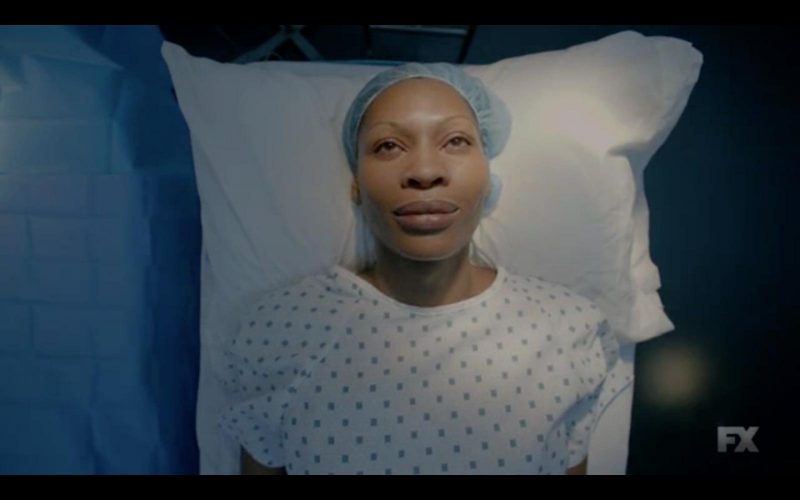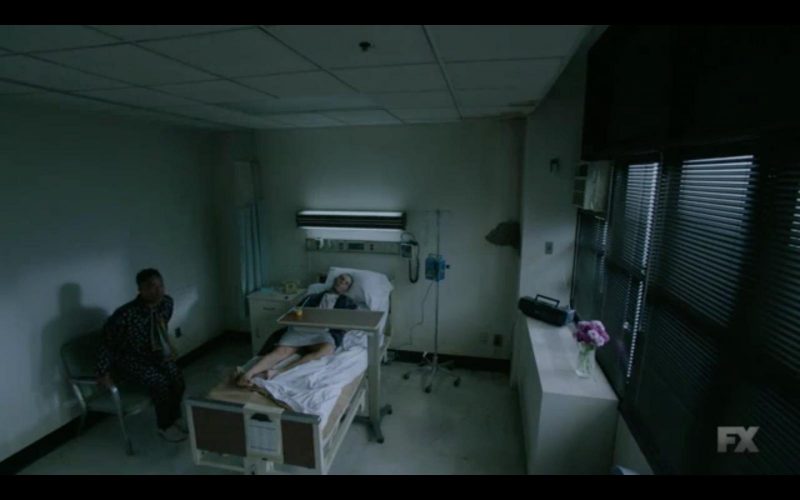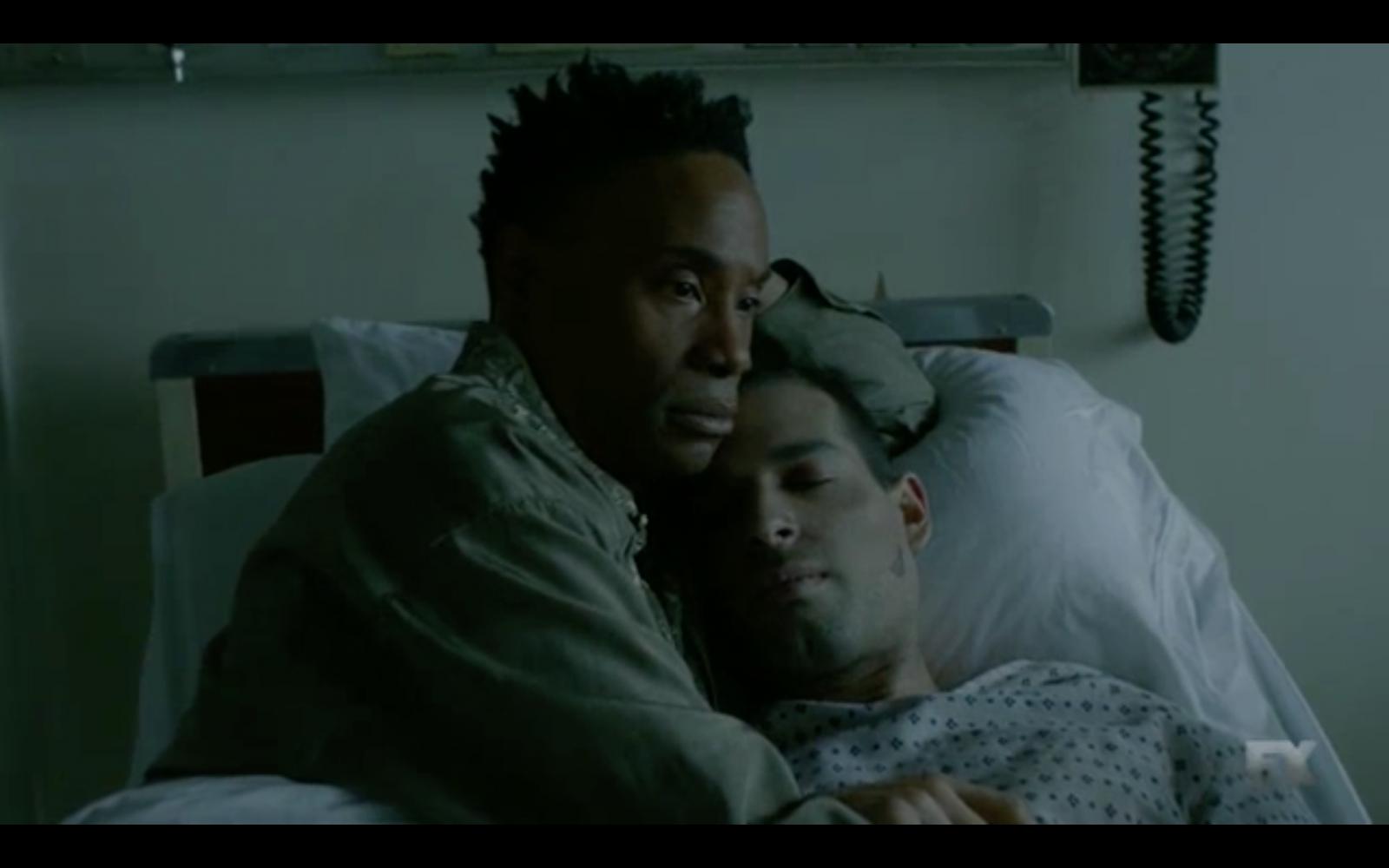Episode 5 and 6 of Pose form a mini-arc that focuses on death and home. In episode 5, Blanca’s bio-mother dies and in episode 6, Pray Tell’s lover, Costas, dies. When I saw episode 5, I wondered why Blanca’s mother’s death was the first death featured on the show. I needed episode 6 to see what Pose was saying about attachment and grief, public and private mourning.
Episode 5 opens in 1982, with Blanca participating in her first ball. The emcee notes her unflattering appearance–“it looks like Cinderella came to the ball after midnight”—and asks, “Where is your mother? Whose child is this?” Blanca responds, “I don’t have a mother or a father.”
Electra adopts Blanca after the ball.
“You’re coming home with mother.”
“Wait, you wanna be my mother?”
“I am your mother.”
Motherhood is marked by choice and desire, “you wanna be my mother?” It is against this flashback that Blanca learns her bio-mother is dead. A neighbor calls her. Not a family member. It is against a background where motherhood is marked through desire: “You wanna be my mother?” We need this background because the series opens with Blanca moving out of Electra’s house and forming her own house.
As mother, Electra is tough, perhaps cruel. She chooses her children and she chooses herself over them. Yet. But. Electra wants—needs—to feel whole, and this, for her, requires bottom surgery. When the opportunity arises, when her doctor tells her it is possible, and when there is available money—money she has earned with her children, money to pay bills and buy presents, money to keep the house a home—Electra chooses herself.

Yet.
But.
“Choose yourself” has a particular currency right now. It is, on the one hand, a fierce critique of the toll cisheteropatriarchy takes on women, demanding unceasing care and time and sacrifice and health: do anything for your family, for your partner, for your children, for your country. Anything. This anything ostensibly demonstrates love and womanhood. A woman who chooses herself is accused of betraying her duties as a woman. Womanhood as perpetual sacrifice.
“Choose yourself” can also be deeply neoliberal, a call that transforms “self-preservation” as “political warfare” (Audre Lorde) into self-preservation as anti-collectivity. Even if one changes Lorde’s “self-preservation” into “self-care” as “political warfare,” for Lorde, the political is always collective, alway about working together across difference, across geohistories, toward freedom. To choose oneself as part of “self-preservation” is to recognize the debilitating effects of capitalism and white supremacy and cisheteropatriarchy and other forms of oppression. Oppression is debilitating.
I learn from Jasbir Puar:
The term “debility” can attach to the global south but can also be deployed in disenfranchised communities within global north locales to suggest debility as endemic, perhaps even normative, to disenfranchised communities: not nonnormative, not exceptional, not that which is to come or can be avoided, but a banal feature of quotidian existence that is already definitive of the precarity of that existence.
Debility as an effect of being minoritized, experienced physically and psychically, as a rupture in self and sociality.
How, then, to think about Electra’s desire to be whole? What forms of wholeness might demand that one be a “bad” mother? How are we to read Electra’s bad mothering against Blanca’s mother’s bad mothering?
Pose never shows us the scene where Blanca was kicked out of home by her mother. We see her at the ball where she meets Electra. We see her confess that she’s homeless and hungry. We see her say that she never wants to be hungry again. But we are left to imagine her mother kicking her out of home. Instead, Pose shows moments of love between Blanca and her bio-mother. A younger me would have been more skeptical about this choice, angry that it attempts to save the bio-family, and, specifically, the sacred mother-child relation. Now I think about the memories we carry with us so we can survive and live, even when we are estranged from those we once believed loved us unreservedly.
Through Electra’s “I am your mother,” Blanca can return to her bio-mother’s “I am your mother,” even as her bio-family—her sister and brother—attempt to disown her.
While Blanca’s mother dies surrounded by family—we do not see the moment of her dying, but we see the service and the reception after the service—Costas, Pray Tell’s boyfriend, dies alone.
Pray Tell visits Costas in hospital, but there’s never any sign that Costas is visited by anyone else. Certainly, Costas never mentions being visited by family or friends. It might be that the moments with Pray Tell are too precious to spend on the “so and so visited me” type of conversations, but the show strongly suggests that Costas is alone.

Hospitals are lonely places, with their visiting hours and scheduled drug administrations and attendant-calling bells. Despite Pray Tell’s visits, Costas dies alone. A phone call lets Pray Tell know that Costas is dead. And those of us who know a little about sexual minorities in relationships and healthcare systems know that Pray Tell was very lucky to receive that phone call.
Repeatedly, AIDS poems and stories describe aloneness: being the only one left in a circle of friends, waiting to die after having watched your lover die, returning home to die surrounded by homo-hating relatives. Darius Bost has written about how writer and editor Joseph Beam died:
In a published letter to Beam, fellow black gay writer and friend Colin Robinson reveals that none of Beam’s close friends knew exactly how he died—if it was suicide, drug overdose, or AIDS—though AIDS was the official version. And in the introduction to his first edited collection of black gay poetry, Assoto Saint, another friend and contemporary of Beam’s, notes that Beam’s body was discovered in an advanced stage of decomposition. Joseph Beam’s dying in silence, especially as a leader of a movement to end the silence around black gay men’s lives, reveals how the public efforts of black gay artists and activists to transform their social worlds could not always alleviate their individual psychic pain. (“Loneliness”)
Every time I read this section of the article, something catches in my throat.
Beam’s In the Life, the first major collection of writing by black gay men, broke silences and eased loneliness for so many of us. It wasn’t that we didn’t encounter each other in clubs and bars and sex clubs and public sex parks, but, as Essex Hemphill described so eloquently, the hungers of such meetings precluded conversations about how we were navigating our worlds. In the Life didn’t announce to us that we existed. We knew that. We saw each other. We touched each other. We loved each other. Instead, we assembled as words on the page, as words we could carry and read on buses and trains and planes, in spaces where we were absented and negated. Other voices could fill our spirits, affirm what could not be affirmed, especially for those of us navigating majority-white gay spaces. If we could not live up to the fierceness and tenderness modeled in the pages of In the Life, we could dream toward futures beyond the negation we occupied.
Pose offers the possibility that Costas dies alone, but not lonely. The mini-concert staged by Pray Tell and Blanca creates a space for something. For me, this something is incarnated by Blanca’s performance of “Home.”
I know “Home” from The Wiz (1978), not simply a remake of The Wizard of Oz (1939), but a complete reimagining through sound. I will misuse Matthew D. Morrison’s idea of “blacksound,” to claim that The Wiz is the blacksound to The Wizard of Oz, a sonic landscape that transforms white fantasy into black possibility.
If “Over the Rainbow” is a (white) gay anthem, gesturing to the possibility of worlds to come where gayness is not so fraught—“And the dreams that you dreamed of / Dreams really do come true”—“Home” points to another geohistory of fantasy.
When I think of home
I think of a place where there’s love overflowing
I wish I was home
I wish I was back there with the things I been knowing
I listen to Diana Ross sing “Home.” I listen to Whitney Houston sing “Home.” I listen to Stephanie Mills sing “Home.” I listen to Jazmine Sullivan sing “Home.” I listen to Beyoncé sing “Home.” I listen to MJ Rodriguez sing “Home.”
I think of the worlds gay men had to invent, the homes they found—still find—in themselves and each other. I think of what it means to be alone, but not lonely.
Living here, in this brand new world
Might be a fantasy
But it taught me to love
So it's real, real to me
"Real to me." "Home," "Where there's love and affection." Not "somewhere over the rainbow," but "home." "We are coming home," Joseph Beam wrote. And, perhaps, in the fantasy world of Pose, in proximity to suffering and near-death, the fantasy of home, of love, can still provide something.
